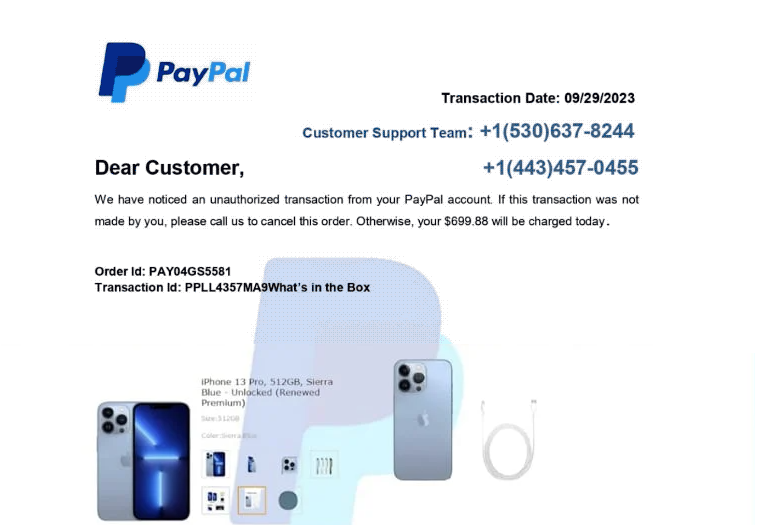“PayPal – Unauthorized Transaction” scam refers to an email part of a phishing campaign that aims to trick users into revealing their personal information and PayPal login credentials. The email is made to look like a security measure by PayPal that informs about unauthorized transactions. Supposedly, a transaction worth $699.88 was made from your account but you can cancel it by calling the provided number. If you were to call, scammers would try to phish your personal information.
The “PayPal – Unauthorized Transaction” email states that PayPal has supposedly noticed an unauthorized transaction of $699.88 from your PayPal account. Supposedly, an iPhone has been purchased. The email asks that if you do not recognize the transaction, you should call the provided phone number to cancel it.
Transaction Date: 09/29/2023
Customer Support Team: +1(530)637-8244 +1(443)457-0455
Dear Customer,
We have noticed an unauthorized transaction from your PayPal account. If this transaction was not made by you, please call us to cancel this order. Otherwise, your $699.88 will be charged today.
Order Id: PAY04GS5581
Transaction Id: PPLL4357MA9What’s in the BoxiPhone 13 Pro, 512GB, Sierra Blue – Unlocked (Renewed Premium)
Size: 512GB
Color: Sierra BlueDescription Quantity Specification Amount
iPhone 15 Pro 01 512GB Sierra Blue $699.88Ensuring the security of your PayPal account is our highest priority, and we are committed to resolving any issues together in order to protect it.
Sincerely,
Team PayPalCustomer Support Team: +1(443)457-0455 / +1(530)637-8244
If you fall for this phishing attempt and call the phone number, you will immediately be connected to professional scammers. These scammers will claim to be from PayPal and agree to cancel the transaction as long as you provide a lot of personal information to supposedly verify your identity. One of the things they will ask for is PayPal login credentials. If you provide this information, the scammers will try to access your PayPal account and try to make real unauthorized transactions. This could result in serious financial loss.
Scammers will likely also ask for other personal information, in addition to the PayPal login credentials. That includes a full name, email address, phone number, home address, etc. Such highly personal information is very valuable to cybercriminals because it can be used to target users with more sophisticated scams. It can also be sold to other malicious actors on various hacker forums.
You need to keep in mind that you should never reveal your sensitive login credentials to anyone, no matter what the account is. Paypal will never request your login credentials as that would be a serious security breach. The same goes for banks. If you ever reveal your login credentials for any account, you need to change the password immediately.
How to recognize phishing emails?
Most users will deal with generic phishing emails that are quite easy to identify. Sophisticated phishing emails are rare because they target specific users, while low-effort ones are more common and aim at many users simultaneously, making them generic and easily recognizable. It’s important to learn the signs of a phishing email so you can recognize them in the future.
The first thing you should check when you receive an unsolicited email is the sender’s email address. Generic and low-effort phishing emails will usually be sent from random-looking email addresses, which makes it easy to immediately identify the emails as spam or malicious. More sophisticated phishing emails will be sent from much more legitimate-looking email addresses. It’s a good idea to research the sender’s email address whether it looks legitimate or not. Even a simple search with Google can often point to an email address being from a malicious account. PayPal uses only a couple of email addresses so it’s easy to verify the legitimacy of any email you receive from PayPal.
Another sign that may point to an email being potentially phishing or malicious is words like “Customer”, “Member”, “User”, etc., being used to address you. This particular “PayPal – Unauthorized Transaction” phishing email addresses you as “Customer”. This immediately gives the email away as malicious because users are addressed by their names in emails sent by companies whose services users use. If a sender should know your name but addresses you using generic words, it’s likely not a legitimate email.
When it comes to emails like this PayPal – Unauthorized Transaction email, it’s easy to check manually whether the contents are correct. The email claims that an authorized transaction was made from your account, and you can easily check this by manually logging in to your account. Always double-check all information before taking any action. The same can be said when dealing with emails that ask you to click on a link to fix something in your account. Instead of clicking on any links, manually log in to your account and check whether there’s an issue.
Site Disclaimer
2-remove-virus.com is not sponsored, owned, affiliated, or linked to malware developers or distributors that are referenced in this article. The article does not promote or endorse any type of malware. We aim at providing useful information that will help computer users to detect and eliminate the unwanted malicious programs from their computers. This can be done manually by following the instructions presented in the article or automatically by implementing the suggested anti-malware tools.
The article is only meant to be used for educational purposes. If you follow the instructions given in the article, you agree to be contracted by the disclaimer. We do not guarantee that the artcile will present you with a solution that removes the malign threats completely. Malware changes constantly, which is why, in some cases, it may be difficult to clean the computer fully by using only the manual removal instructions.
